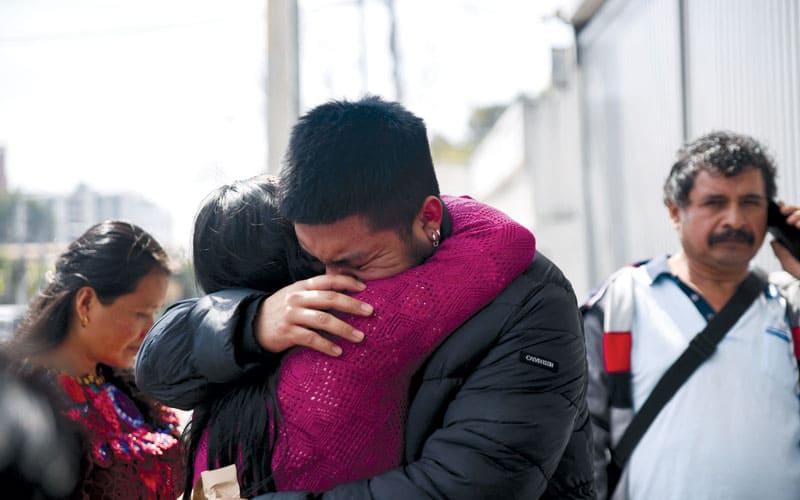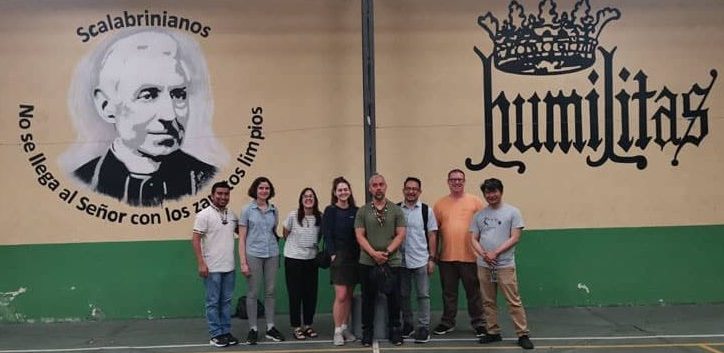Casa del Migrante, a Catholic shelter run by Scalabrini missionaries in Guatemala City, welcomes migrants deported from the United States.
A few months ago, a 50-year-old Venezuelan woman named María arrived at Casa del Migrante, a shelter run by Scalabrini missionaries in Guatemala City. Every day, the shelter takes in nearly 30 people in transit who, like María, seek refuge, food and protection.
María (not her real name) said that she had decided to migrate to the United States out of fear of retaliation after participating in protests against her country’s president, Nicolás Maduro. Hoping to start a new life, she applied for asylum at the U.S.-Mexico border but was deported to Mexico and eventually arrived in Guatemala.
Deacon Leonel Yoque, a member of the Maryknoll Mission Formation Ministry, has listened to stories from migrants like María. He leads groups of Catholic leaders from the States to visit Casa del Migrante as part of an immersion program. “Maryknoll’s charism is to go and encounter people in need,” he says. “We expose participants to look closely at the reality of migration and the violence, poverty and climate change that are forcing Indigenous people to migrate.”
Yoque, who in July will lead another group on a Maryknoll immersion trip to Guatemala, adds: “After visiting the shelter, I have seen a transformation in the participants showing solidarity with the migrants.”
In recent months, the situation for migrants has become even more unstable. Upon taking office in January 2025, President Donald Trump signed a series of executive orders such as ending U.S. asylum applications at the border, discontinuing the CBP One mobile app, and canceling Temporary Protected Status (TPS) for people from several countries, including Venezuela.
Lorena Pérez, project manager at Casa del Migrante, says migration patterns have changed compared to 2024. “Before, it was mostly Venezuelans who arrived, and then Hondurans on their way to the U.S.,” Pérez says. “Now we are assisting deportees like María. There’s a percentage of people who have been in the U.S. for many years and have been deported.”
For Pérez, it is important that people experience the restoration of the human rights they have lost while fleeing their countries and while traveling through other countries as undocumented migrants. “Offering food, lodging, and showers with hygiene kits are acts of humanity,” she says. “We also provide integral protection, legal counsel, medical assistance and psychological and spiritual support.”

There is a statue of the Virgin Mary in the shelter, and migrants come to pray, Pérez says. “The deportees especially ask if there’s a chapel,” she says. “They go to pray and sometimes ask to speak to a priest.”
According to shelter records, approximately 2,600 people heading to the United States were registered each month in 2024. Recently, the monthly average is about 800 migrants. Half of these migrants have been deported, with many in transit to their country of origin, while the other half still hope to make it to the United States.
At the same time, the shelter has expanded its services. It created a team that offers support to newly arrived deportees at La Aurora International Airport. “Casa del Migrante plays an important role in supporting and strengthening the Guatemalan State by opening its doors,” Pérez explains.
“At the reception center for returned migrants everything is handled very quickly, and sometimes the deportees don’t know what to do,” Pérez says. “Maybe they have a relative, but they live miles away from the capital. That’s where we support them and take them to Casa del Migrante.” In other cases, she adds, “some deportees have no relatives because they’ve been living in the United States for a long time.”
According to the Guatemalan Migration Institute, as of March of this year, 7,190 migrants have been deported to Guatemala, including 1,515 deported from Mexico and 5,675 deported from the United States.
“Families and friends supported migrants when they were traveling to the U.S. because they knew they would get their money back. Now they are left with debts and no help, even if they want to return home,” Pérez says. “At the shelter, you can feel an atmosphere of worry, anguish and anxiety among the new arrivals.”

If foreigners have a valid passport and the documentation required by their consulates, sometimes the shelter helps them purchase plane tickets.
Casa del Migrante receives food and clothing donated by the local community, as well as financial assistance from several international projects. After President Donald Trump shut down the U.S. Agency for International Development (USAID), the shelter lost this source of funding, which had been delivered via the Norwegian Refugee Council, an international humanitarian organization. USAID covered 25% to 35% of the shelter’s expenses, including staff salaries and food supplies.
The shelter was notified in late January of the impending cut, and the cancellation of funding took place a month later. A woman in charge of the program lost her job, and other employees have to be relocated. “The situation is complicated, but we have to restructure,” Pérez says. “We are a Catholic organization, and in difficult times, we see the hand of God. When we’re left with nothing, help comes.”
Casa del Migrante has reported that more deported migrants are seeking asylum in Guatemala. Many are in limbo because they can’t enter the United States, but they also can’t return to their home countries, especially if they were persecuted, fled crime, or were victims of extortion.
Such is the case of María, who remains at the shelter. “She requested asylum and often prays before the Virgin Mary statue while she waits for a response from our National Commission for Refugees,” Pérez adds. “Guatemala is a destination country and welcomes refugees.”
Featured image: Guatemalan migrants deported from the U.S. under President Donald Trump’s administration arrive at La Aurora Air Base in Guatemala City on January 27, 2025. (OSV, Cristina Chiquin, Reuters/Guatemala)

